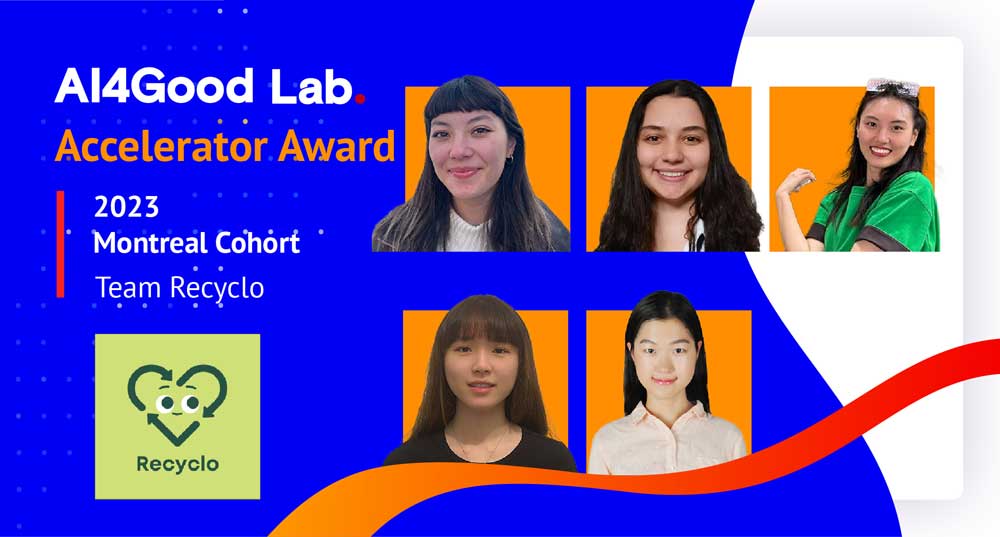
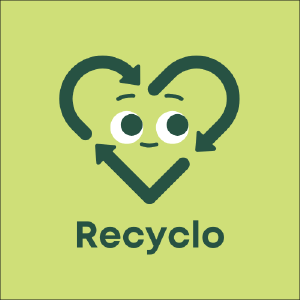
Team members
Blue Namba, Rency Waneskehian, Zhen Xu, Dejun Yang, Haiqi Zhou
Project summary
Make better recycling decisions with Recyclo — our AI-powered image detection guides your waste to the right destination.
Keywords
Recycling, Image Detection, CNN Model, Montreal, Sustainability, Education, ResNet101, Waste, Contamination
Inspiration / background
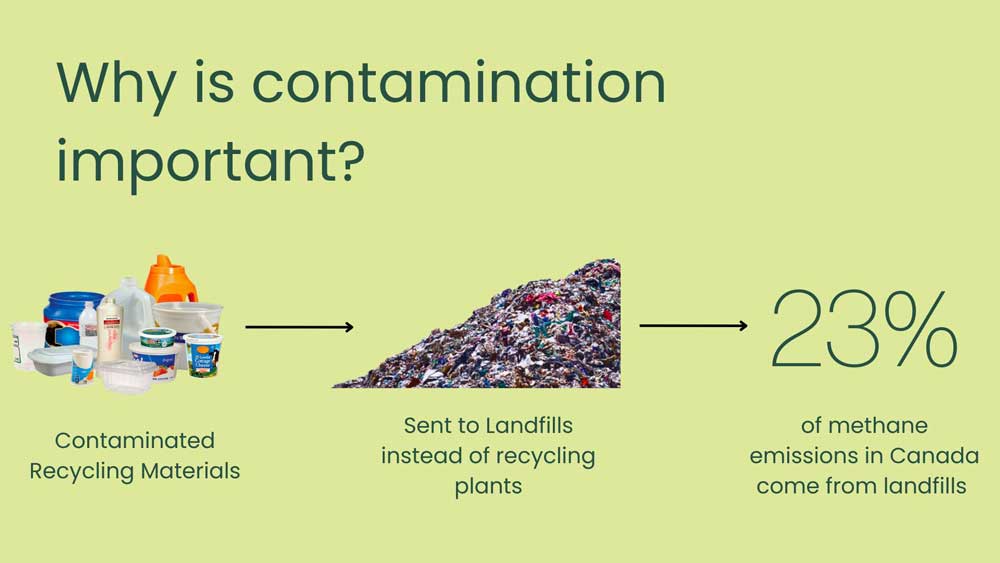
As the world is facing pressing environmental issues, our goal is to practice and encourage responsible recycling. One of the biggest problems is the contamination of materials either from being mixed up or from leftover food and liquids. In Montreal alone, the level of contamination in paper bales is 9 times higher than the industry threshold (Shingler and Hendry 2022).
We decided to explore more on this issue and see how we can use machine learning techniques to help reduce contamination in Montreal’s recycling plants. We came up with the idea of creating an app that uses image detection to give suggestions and tips on how to recycle. The inspiration behind a user-centered solution comes from our confusion and experience with recycling guidelines. We’ve all stood in front of the trash bins, feeling puzzled and afraid to do the wrong thing.
Beyond assisting people with recycling, we hope to educate and increase awareness around overconsumption and how it is affecting climate change. We conducted extensive research on Montreal’s recycling operations in order to understand if a platform like Recyclo would be helpful. Given that Montreal and many cities have high rates of contamination, we believe a tool like Recyclo can allow individuals to do their part in the recycling crisis.
List of Technologies
- Google Colab
- Weights & Biases
- GitHub
- ResNet-101
- Glitch
- Programming languages: Python, HTML/CSS/Javascript
Project development
Recyclo scans a picture of your waste and tells you how and where to dispose of it. You can take a picture of anything from a plastic coffee cup to electric batteries, or even old clothes.
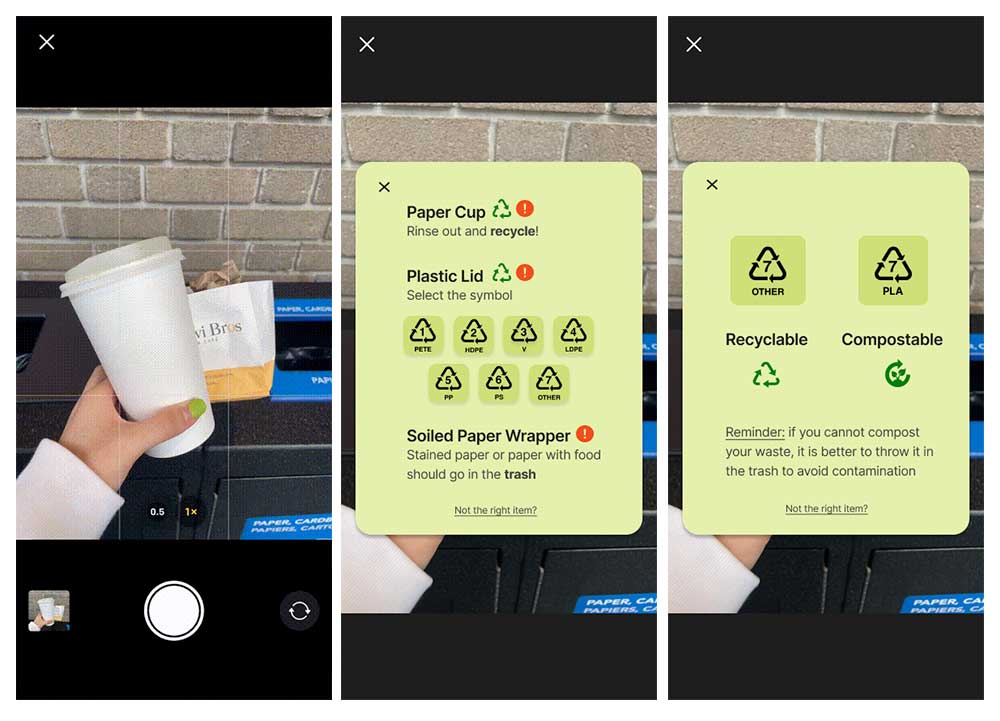
While doing initial research, we came across a GitHub repository called “Trashbox”, which contains 17,785 images of waste divided into seven categories: glass, plastic, metal, e-waste, cardboard, paper, and medical waste. Each class is further divided into subclasses. For example, the medical waste category includes Syringes, Surgical Gloves, Surgical Masks, and Medicines. We picked Trashbox as our main dataset and supplemented it with other waste categories such as compost and clothing.
After compiling the images together, we labeled them with their category name.
Overall, our model is a fairly typical use case of computer vision, where we did a train-test-validation split, and fine-tuned the ResNet-101 model on our training data. With several hours of training, the fine-tuned model reached around 90% accuracy. Once the model was trained, we were able to set the camera input of our web app as the input for model prediction.
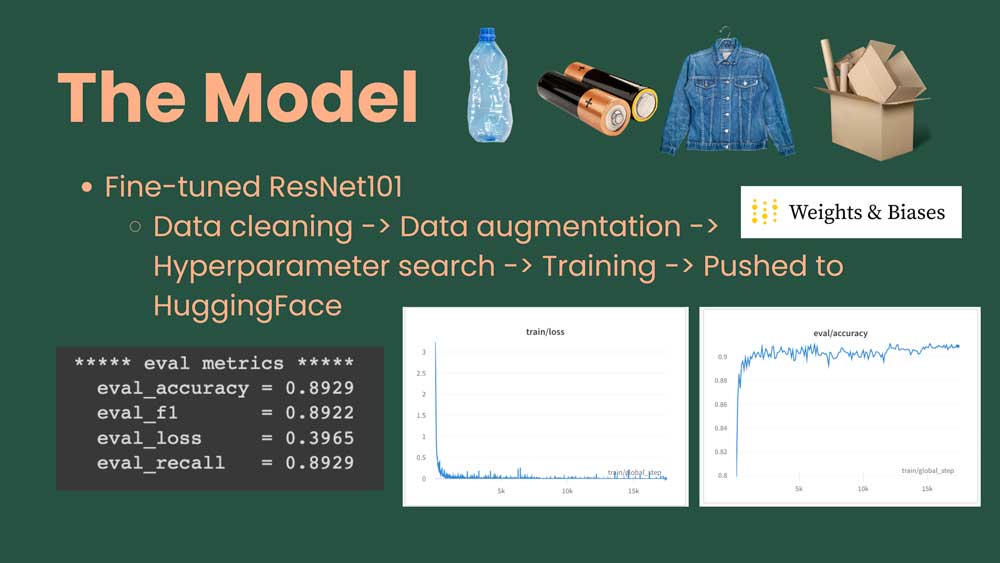
To know exactly where the waste should go, we researched recycling and waste disposal in Montreal. We got in touch with Recyc-Québec, the governmental organization for waste collection and recycling which is also responsible for the website/app “Ça va où?”. During our meeting, the representative of Ça va où? mentioned that they have not yet found a model accurate enough to incorporate into their system, so there is a chance that we can collaborate with them in the future when our model has been further improved. We obtained data from Ça va où? containing details of where different types of waste should go as well as all the locations of eco centers and recycling facilities in Montreal. From there, we created a dictionary that links our model prediction to the information we display after an item is scanned. As well, we utilized the Google Maps API to connect the user to their nearest eco centers and clothing donation centers if the item should be disposed of there.
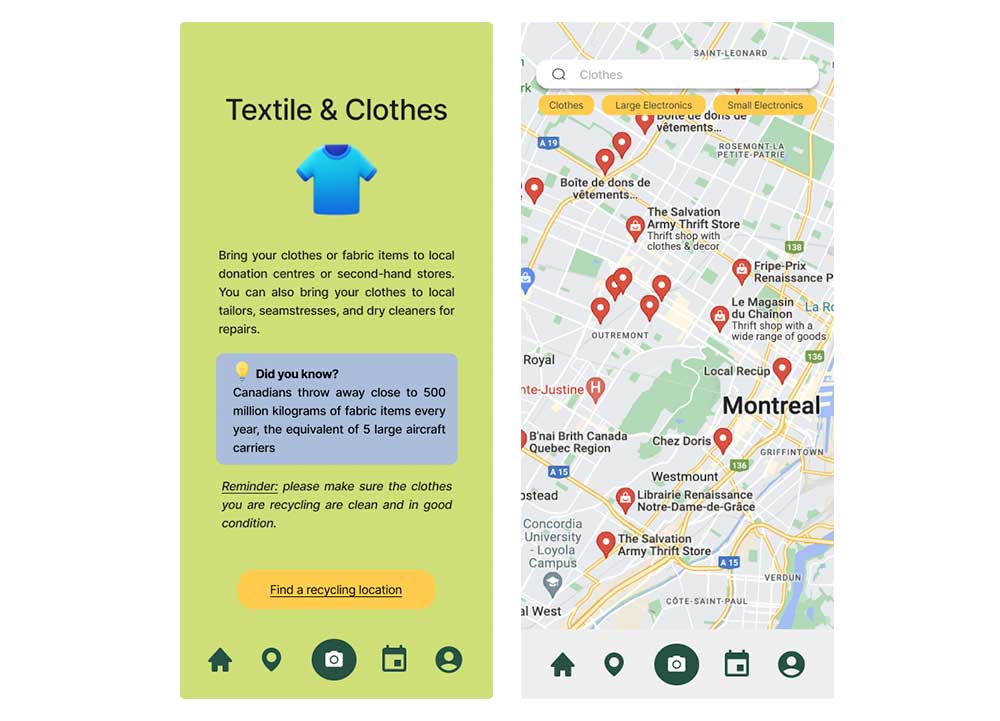
Impact/Innovation
There are a few apps offering image detection to identify waste. In Europe, there is Recycling Assistant and EcoSnap, and in Australia Recycle Mate. In Montréal, “Ca Va Où?” is the go-to app to search for disposal instructions for almost any object, but it does not come with an image detection feature. From our discussion with the Ca Va Où team, we understood that the biggest issue with image detection right now is the unreliability of predictions.
To avoid inaccuracies, we give the option to report an incorrect object detection, this will also help improve our model as it will learn from its mistakes. We’ve also tried to ensure that our recommendations avoid the worst outcome: contamination. It may seem counterintuitive to encourage users to throw away potentially recyclable materials in the landfill. In the case where users can’t rinse out their container, throwing it in the trash avoids contaminating a whole batch. For example, if cardboard has permanent grease or food stains, it should be thrown into the trash. Recyclo emphasizes these detailed rules with a simple and intuitive interface.
Another ethical consideration we’re aware of is the small role recycling plays in the broader picture of sustainability.
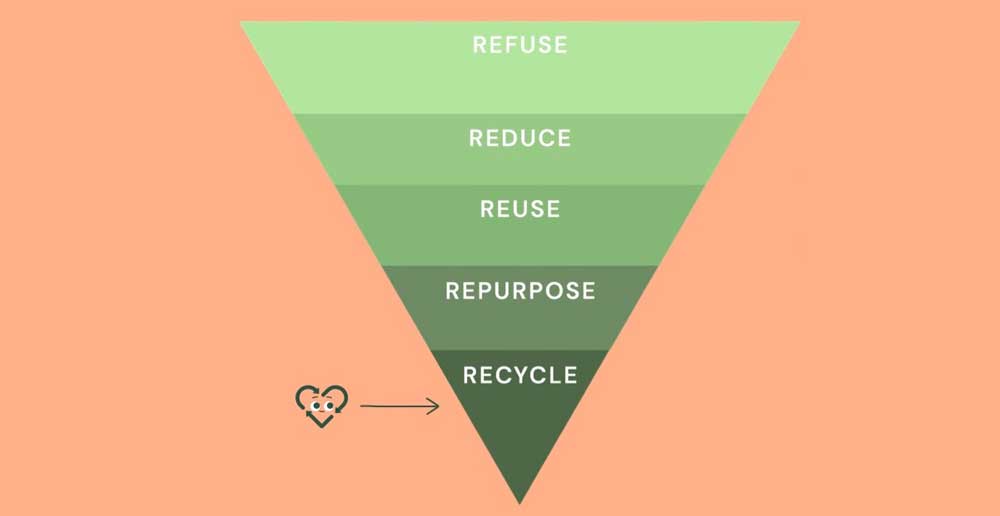
The first step is always to refuse and reduce consumption. Recyclo is simply a tool to help users be more knowledgeable and mindful of how they recycle. We do not want to fall into a greenwashing narrative, claiming that recycling is the ultimate solution. Even if people properly sort their waste, there is no guarantee that it will get recycled. We must keep in mind that only 9% of plastics get recycled in Canada (Blair, n.d.). According to the National Resources Defense Council, facilities that claim to have “chemical recycling” don’t recycle plastics, they get incinerated or piled up (Singla 2022). It’s also a common misconception that plastic gets recycled, it’s often downcycled, meaning that it loses strength and quality throughout its lifetime (Krosofsky 2021). Of the plastics that don’t get recycled, a lot get shipped overseas to countries with low wages and relaxed laws (Krosofsky 2021). Keeping in mind these ethical considerations, our team believes that being the first image detection recycling assistant in Montreal could significantly reduce contamination in its recycling plants.
Challenges we ran into & how we overcame them
One challenge we came across in our model-training process was dealing with out-of-distribution inputs – what if someone randomly scans an object that is not in our category? What if the model only “guesses” and gives a wrong result? We have come up with two solutions that can be implemented. First, we can train the model with an “Other” category that contains images of random objects. By doing so, the model will tell the user that it doesn’t know the object, thus preventing misinformation. Second, we investigated the possibility of simply using a pre-trained ResNet 101 model (not fine-tuned on waste images) that can detect 1000 categories from the ImageNet dataset. We selected categories that could be classified as waste using Natural Language Processing and compiled them into dictionaries. All the other categories would render the model to output that it is not sure. One problem with this strategy is that the model is less accurate in waste detection compared with the fine-tuned model.
As mentioned above, we also find that more work needs to be done on distinguishing between materials that look similar, e.g. glass and clear plastic. The model seems confused if a plastic water bottle is cylindrical and has no plastic wrapper on it. To improve the model, we would need a larger training set for the categories of glass and plastic and potentially a model better at extracting features from different materials.
What we learned & accomplishments we’re proud of
We are extremely grateful to the AI4Good Lab for providing us with a platform where we could share our curiosity and interest in AI with people of all backgrounds. Through workshops and lectures, we gained a deep understanding of how to incorporate ethics in every aspect of our AI project. We also had the opportunity to work with and learn from the best professionals in the field.
Through developing Recyclo, we worked successfully as a team and improved our project management skills. An important principle we followed was to attribute roles based on our strengths but also on what interests us. We all started the project with unique skills but were pleased to see each other take on new tasks to step out of our comfort zone.
Beyond the knowledge we gained, we will never forget the meaningful friendships and cherishable memories we made during our classes and chats at lunchtime with AI4Good trainees. We also recognize the hard work of our inspiring mentors and TAs who were always there to help us develop our ideas and mentored us along every step of the project.
What’s next for us / the project
As one of the Accelerator Awards winners, our team could take part in Mila’s Entrepreneurship Lab, a program aiming to launch startups. It inspired our team to keep working on Recyclo and explore our potential paths. At the moment, one of our most pressing challenges is to improve the accuracy of our machine-learning model. While it is currently at a 90% accuracy rate, we are exploring ways to enhance our ResNet-101 model. The essence of Recyclo is to simplify recycling; if we were to publish our app, we would want to guarantee a seamless and accurate experience. We’re also conscious that there are certain waste items beyond our current identification capabilities. As we progress, our goal is for Recyclo to recognize a wider array of objects and to identify soiled materials.
Given our imposed time limit, we focused our project on Montreal. Eventually, our goal would be to make it a universal platform. Given that recycling is often confusing for people who’ve recently moved to a new city, we want to make Recyclo available in every country.
If we were to take Recyclo to the next level, it is crucial to consult with recycling experts and researchers to provide the most up-to-date recommendations. We also hope to receive input from environmental ethics professionals who could help us determine if AI is the optimal solution. While we are extremely passionate about our project, questioning and discussing the potential impact of our work is a value that the AI4Good Lab has instilled in us.
Haiqi is currently still a Master’s student in McGill’s Digital Humanities program and is working as an NLP research assistant at .txt lab. She is also attending the Entrepreneurship program at Mila hoping to find a way to take Recyclo to a bigger stage. If you can’t find Haiqi, she is probably diving in Hawaii :)
Zhen has graduated from McGill and is studying for a Master of Management in Analytics at Rotman School of Management, University of Toronto. She will graduate in 2024 and pursue a career in data science.
Dejun is entering her final year of the Bachelor of Computer Science program at McGill University. She aims to pursue further studies in Computer Science at graduate school and delve deeper into the AI field.
Blue is in her last year of undergraduate studies in Business Analytics and Environment at McGill. She hopes to combine data analytics with an environmental cause like food security, biodiversity, or climate change.
Rency is completing her Bachelor of Computer Science at McGill. She plans to continue her studies in AI at the graduate level.
References
Blair, Nicole. n.d. “Recycling Statistics in Canada for 2023.” Made in CA. Accessed September 29, 2023.
Krosofsky, Andrew. 2021. “What Is Downcycling?” Green Matters.
Krosofsky, Andrew. 2021. “What Percentage of Recycling Actually Gets Recycled?” Green Matters.
Shingler, Benjamin, and Leah Hendry. 2022. “Montreal’s recycling program is in a dire state, but there are solutions.” CBC.
Singla, Veena. 2022. “Recycling Lies: “Chemical Recycling” of Plastic Is Just Greenwashing Incineration.” NRDC.